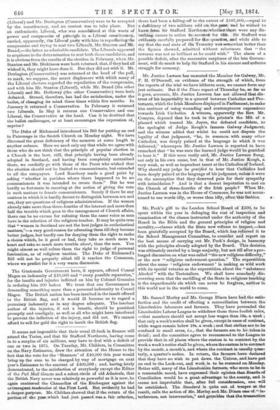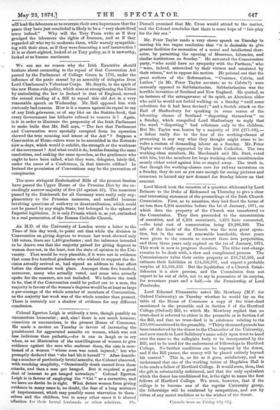Mr. Samuel Morley and Mr. George Dixon have had the
satis- faction and the credit of effecting a reconciliation between the Lincolnshire labourers and farmers. They have persuaded the Lincolnshire Labour League to withdraw those three foolish rules, —that members should not accept less wages than 18s. a week ; that only a week's notice shall be given, except in cases of contract, while wages remain below 18s. a week and that strikes are to be confined to small areas, i.e., that the farmers are to be taken in detail ; and the committee agree to recommend to the League to provide that in all places where the custom is to contract by the week a week's notice shall be given, where the custom is to contract by the month, a month's, and where the contract is usually quar- terly, a quarter's notice. In return, the farmers have declared that they have no wish to put down the Unions, and have put an end to the Lock-out, and work is to be resumed on Monday. Better still, many of the Lincolnsnire farmers, who seem to be in a reasonable, mood, have expressed their opinion that Boards of Conciliation would be a great advantage to the county, and it seems not improbable that, after full consideration, one will be established. The Standard is quite out of temper at the result, calls the action of Mr. Morley and Mr. Dixon one of "in- terference, not intervention," and grumbles that the transaction
will lead the labourers so to -overrate their own importance that the peace they have just concluded is likely to be a "very short-lived' truce indeed." Why will the Tory Press write as if they grudged the labourers the rights of freemen, and as if they regarded all who try to moderate them, while warmly sympathis- ing with their aims, as if they were fomenting a serf insurrection? It is as short-sighted, looked at as Tory policy, as it is unworthy, looked at as -human sentiment.



































 Previous page
Previous page